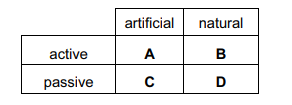Question
Antibodies can act in a number of ways to protect the body from pathogenic bacteria.
Which event will not occur following antigen-antibody binding?
A agglutination of bacteria to reduce their spread
B increased susceptibility to phagocytosis
C neutralisation of toxins to make them harmless
D secretion of histamine to produce an allergic reaction
Answer/Explanation
Answer D
Option D, secretion of histamine to produce an allergic reaction, will not occur following antigen-antibody binding. Antibodies can agglutinate bacteria, making them easier to engulf and destroy by phagocytic cells. Antibodies can also neutralize toxins by binding to them and preventing them from causing harm. However, histamine secretion is a function of the body’s immune system, not of antibodies.
Question
Which development in vaccine production would be most important in the fight to eradicate measles in developing countries?
- a combined vaccine to combat it and other diseases
- a single vaccine, without the need for boosters
- a vaccine containing only live measles viruses
- a vaccine produced by genetic engineering techniques
Answer/Explanation
Ans:
B
Option B, a single vaccine without the need for boosters, would be most important in the fight to eradicate measles in developing countries. In these countries, it can be difficult to ensure that people receive multiple doses of a vaccine, so a single-dose vaccine would be more effective in achieving widespread immunity. A combined vaccine or a vaccine produced by genetic engineering techniques may be useful, but a single-dose vaccine would be more practical for use in developing countries. A vaccine containing only live measles viruses may be effective, but it would need to be handled carefully to prevent the spread of the disease.
Question
A student wrote down three statements about antibodies.
- Their structure depends on peptide, hydrogen and disulfide bonds.
- They are protein molecules with both tertiary and quaternary structure.
- Four polypeptides provide four antigen binding sites.
Which statements are true?
- 1, 2 and 3
- 1 and 2 only
- 1 and 3 only
- 2 and 3 only
Answer/Explanation
Ans:
B
The answer is B, 1 and 2 only. Statement 1 is true because the structure of antibodies depends on peptide and hydrogen bonds, but not disulfide bonds. Statement 2 is true because antibodies are protein molecules with both tertiary and quaternary structure. Statement 3 is false because two polypeptides provide two antigen binding sites, not four.
Question
Which type of immunity occurs as a result of the ingestion of antibodies by an infant through its mother’s milk?

Answer/Explanation
Ans:
D
Question
Why has vaccination failed to eradicate cholera?
- The pathogen exists in many strains which mutate.
- The pathogen is present in the lumen of the gut.
- The pathogen is waterborne.
- There is a stage of the life cycle in other mammals.
Answer/Explanation
Ans:
B
The correct answer is B) The pathogen is present in the lumen of the gut. Cholera is caused by the bacterium Vibrio cholerae, which lives in the small intestine of infected individuals. The bacterium is spread through contaminated water or food, and can cause severe diarrhea and dehydration. While vaccination can help prevent cholera, it is not always effective and does not provide long-term immunity. Therefore, improving sanitation and access to clean water is crucial in preventing the spread of cholera.
